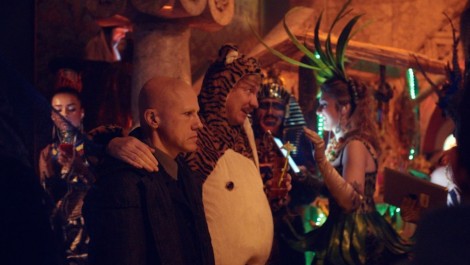Why you can trust GamesRadar+
Is it just us, or is there a trend for handsome male stars shaving their heads? We’ve just had Matt Damon going slaphead in Elysium , and now here’s Christoph Waltz doing his best billiard-ball impression for Terry Gilliam. Waltz plays the deeply dissatisfied Qohen Leth who lives in a disused, pigeon-infested church sometime in the near future and slaves as a number-cruncher for the Mancom corporation (“Making Sense of the Good Things in Life”).
Leth, who always refers to himself in the plural, has been waiting all his life for a phone call that, he believes, will reveal the meaning of existence. Meanwhile, on the recommendation of his supervisor Joby (David Thewlis), he’s set to work solving the ‘Zero Theorem’, an elusive calculation that, if resolved, will prove that “everything adds up to nothing”.
Dystopias, of course, are nothing new for Gilliam, from Brazil (1985) to Twelve Monkeys (1995). This one, though, is a little different, in that apart from the glum and monochrome Leth, everybody’s prancing around wearing garish costumes in what looks like some kind of non-stop carnival.
But behind the surface jollity lurks the monolithic all-encompassing Mancom, at its heart a huge pulsating doom-machine straight out of Fritz Lang’s Metropolis . Its human representative, Management (Matt Damon, this time with hair), singles out Leth as ‘the chosen one’ – but that’s a lot less of a privilege than it might seem.
Helping, or maybe hindering, Leth in his quest come geeky teen-genius Bob (Lucas Hedges), who claims to be Management’s son, and perky sex-bomb Bainsley (Mélanie Thierry), who saves him from choking at a party with the Heimlich manoeuvre and then whisks him off to a virtual-reality Hawaiian beach.
He’s also counselled by on-screen analyst Dr Shrink-Rom (Tilda Swinton), whose advice veers increasingly into fruitcake territory. As ever, when Gilliam’s on form the film’s sprawl of ideas is gratifyingly rich, with take-it-or-leave-it sight gags tossed into the mix: a talking ad for The Church of Batman the Redeemer, and pizza boxes that sing a cheery little greeting when you open them.
There’s a moral behind the black humour, of course, to do with the futility of seeking universal answers – positive or negative – rather than accepting life as it comes. But whether or not you buy that, the reward here is seeing one of cinema’s most original and creative mavericks on fine form.
Verdict:
The future as candy-coloured paranoid nightmare: not quite Gilliam’s best, but still the most satisfying movie he’s made for years.






